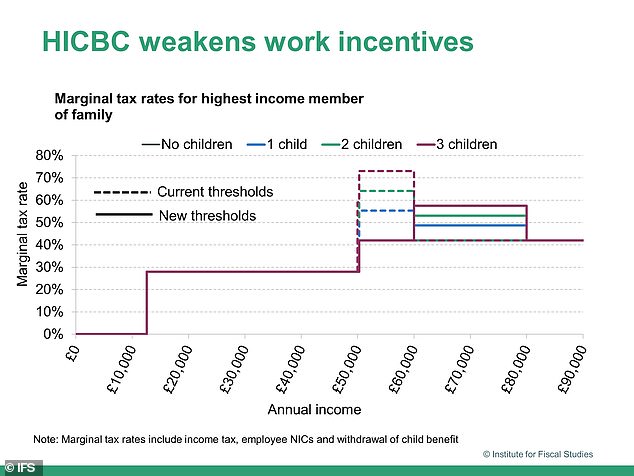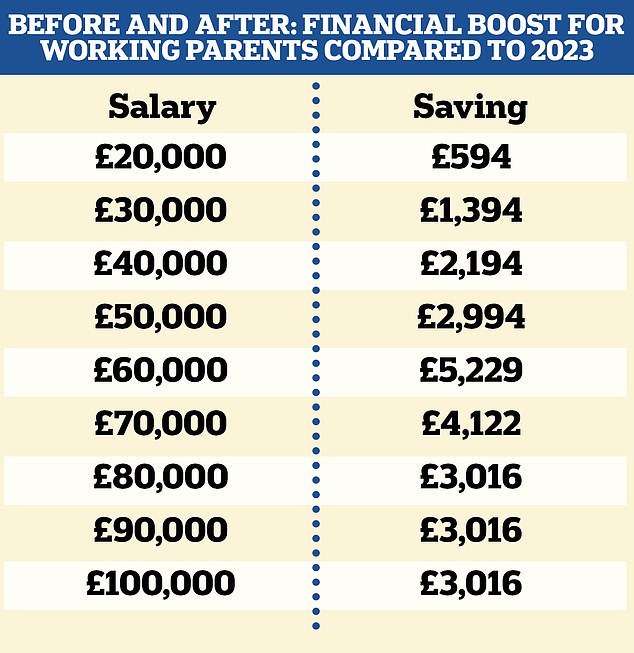Table of Contents
Data suggests middle-income people with children have been the biggest winners from the Budget after the Chancellor made sweeping changes to the way child benefit is paid.
Jeremy Hunt confirmed the much-watched 2p cut to National Insurance, while the big rabbit out of the hat was raising the child benefit threshold to £60,000.
A couple with two or more children where each member earns £60,000 a year will have the biggest increase in their take-home pay as they will receive the maximum NI increase and will now be able to claim full child benefit.
We explain how much parents will save this year with the double whammy of tax cuts and who won’t benefit from this week’s budget.

Working parents earning more than £60,000 a year each were the budget’s biggest winners
What do the changes mean for parents?
Jeremy Hunt announced another Cut Social Security contributions. (NIC) from 10 per cent to 8 per cent, just two months after another 2p cut came into effect in January.
Another cut to NICs means workers will see another small rise in their monthly take-home pay, with an increase of almost £450 a year for the average earner on £35,000.
However, those earning more than the highest rate threshold of £50,270 will make the biggest savings, according to analysis by AJ Bell.
Your NI contributions will be reduced by £754 a year from April, which, combined with the savings that came into effect in January, will rise to £1,508 per person.
A working couple who both earn £50,270 or more doubles this to a saving of £3,016 for the household.
Hunt also announced changes to high-income child benefit, which has been widely criticized since its introduction in 2013.
From April, the threshold at which it is repaid will rise from £50,000 to £60,000, while the threshold at which it is withdrawn will rise to £80,000.
Hunt also said that by 2026 the system will change to assess household income in a bid to mitigate the controversial tax trap.
> What the budget means to you; Also, use our tax calculator
The changes mean that a parent earning £60,000 will be able to claim full child benefit, which from April will be £25.60 a week for one child and £16.95 for subsequent children.
Someone who was previously unable to claim child benefit because of high income will now be able to do so in full, which equates to an extra £2,212.60 a year for two children, or £3,094 for parents with three children.
However, the changes simply raise the threshold and do little to change the marginal tax rates now faced by those earning £80,000.
Figures from the Institute for Fiscal Studies (IFS) show that parents with three children will face a marginal tax rate of just under 60 per cent, while those with one will pay 50 per cent.


Parents earning £80,000 will still face high marginal tax rates despite threshold changes
How much will parents save after the Budget?
The combined impact of the NIC cuts and changes to child benefit means that a couple earning £60,000 with two children will save £5,229 a year (or £435.75 a month), while a couple with three children will get Extra £6,110 a year.
A person earning £60,000 and having two children will save £3,721 a year, or £318.42 a month.
Those earning less than £60,000 will see a marginal tax cut in the form of NICs, but they already receive full child benefit so will not see any increase.
Similarly, those with two children earning between £80,000 and £100,000 will receive £3,016 more a year because they receive the full NI savings but not child benefit.
Check out the table below for the full breakdown of what working parents will save this year.


Source: AJ Bell. Based on the combined impact of NI cuts and lifting the threshold for the high-income child benefit charge.
Once a couple earns more than £100,000, the entitlement to tax-free childcare is removed, and some entitlement to publicly funded childcare places is also removed.
This may mean that a parent with two children would be better off earning £99,999 and running their nursery tax-free than earning more than £100,000.
Laura Suter, personal finance director at AJ Bell, said: “Clearly these figures can’t be taken in isolation – they come against a backdrop of frozen income tax bands, a huge rise in personal taxes and rising prices outpacing large part of the donations. made in the Budget.
‘Parents only have to take a look at their childcare bills to see how much of these benefits will be eaten up by that single rising cost. But either way, the boost to working parents’ family budgets is significant and much better than if no changes were made to the Budget.’
Who lost out in the Budget?
While some parents might be applauding the changes, Hunt has come under fire for doing nothing for retirees.
Those over state pension age will not benefit from the changes to NI because it is a tax on earned income and is paid by employees and the self-employed.
Suter said: “While most of these people will no longer be paying for their children, they have still faced a significant increase in costs, from energy bills to food purchases and rent.” They get no benefit from the changes to National Insurance as it is not paid by people over state pension age.
“Very few will benefit from the changes to child benefit as it is only paid until the child is 16 or 20 if they are in education or training.”
Toby Tallon, tax partner at Evelyn Partners, said: ‘By doubling his Autumn Statement NIC cut, Hunt is favoring younger cohorts over older ones, and those over state pension age are not subject. to the NI at all.
“As it also does not benefit those who earn income from other sources or pay tax on their assets, it means there is little to celebrate for the older electorate that Conservative chancellors have traditionally courted.”
However, in the autumn statement, the Chancellor confirmed that thanks to the triple lock, pensioners will see their state pension increase by 8.5 per cent. The new state pension will rise to £221.20 a week from April.
Mr Suter said: “The state pension has risen by just £1,900 in the last two years, so pensioners cannot claim they have not received anything from Hunt’s dessert trolley selection.”
Some links in this article may be affiliate links. If you click on them, we may earn a small commission. That helps us fund This Is Money and keep it free to use. We do not write articles to promote products. We do not allow any commercial relationship to affect our editorial independence.

